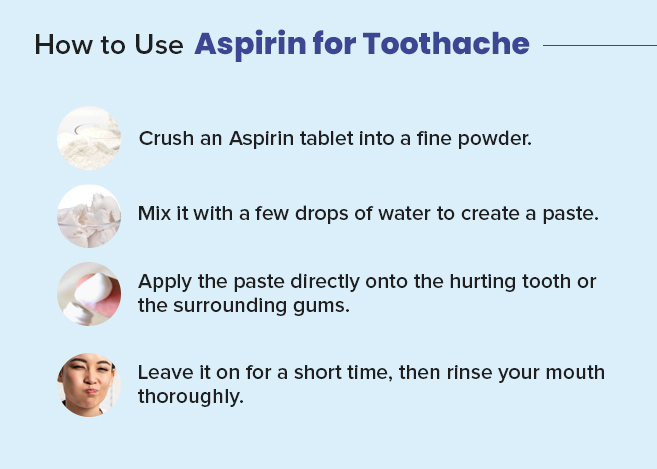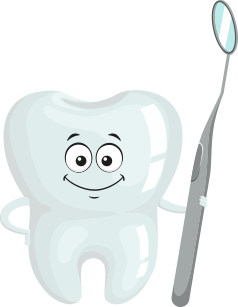Using Aspirin Directly on a Toothache: Does it Work?


Dealing with a toothache is no fun. The sharp pain can make it hard to focus on anything else. Just like any other pain, a toothache can change from mild to extreme. Toothaches can be constant and last for extended periods of time, or they can be irregular at times. Everything depends on the cause of the toothache.
In times of pain, some people often turn to home remedies to get some relief. One such remedy that has been buzzing around is using Aspirin directly on the hurting tooth. But does it really work? In this blog, let’s find out!
Understanding Toothaches
Toothaches usually occur when the nerves in your teeth are unhappy or distressed. This can be due to various reasons like cavities, infections, or even an annoying piece of food stuck where it shouldn’t be. The pain can range from a dull ache to a sharp, severe sensation.
Everything You Need to Know About Aspirin
What is Aspirin?
Aspirin is a common over-the-counter pain reliever. It’s often used to alleviate headaches, migraines, muscle pain, and joint pain. But can Aspirin help a toothache? Yes. When it comes to toothaches, the anti-inflammatory nature of Aspirin can provide temporary relief. Let’s know more about this in detail.
How Aspirin Works:
Aspirin is like a superhero for pain. It fights inflammation, which can help calm down the sore nerves causing your toothache. It also blocks pain signals, giving you some much-needed relief.
Can Aspirin Help a Toothache?
Now, the big question: Can putting Aspirin directly on a hurting tooth help? Some people say, yes, it is. They crush an Aspirin, mix it with a bit of water to make a paste, and apply it to the sore tooth. It’s a DIY approach to pain relief.
The Science Behind It:
Aspirin does have anti-inflammatory properties, and applying it directly might provide temporary relief. However, it’s important to note that this is not a cure. It’s more like a Band-Aid for the pain.
How to Use Aspirin for Toothache:


Caution:
While many people find relief with this method, it’s essential to be cautious. Aspirin is meant to be swallowed, not applied directly to your teeth. Doing this too often can have negative effects, such as irritation to your gums or mouth.
When to See a Dentist
While the DIY Aspirin trick might offer temporary relief, knowing and treating the root cause of your toothache is crucial. Schedule a visit to the dentist if the pain persists. They can identify the issue and provide a proper solution.
Other Home Remedies
If you’re not convinced about this idea of using Aspirin, there are other home remedies to explore:
- Rinse your mouth with warm saltwater.
- Apply a cold compress to the outside of your cheek.
- Clove oil can provide relief; just be sure to use it sparingly.
Conclusion
We know that odontophobia (fear of the dentist) is a real roadblock for some people. While Aspirin might offer some relief, it’s essential to remember that it’s not a permanent solution. Don’t skip that dentist appointment! They’re the true heroes in the battle against tooth pain.
So, if you are looking for some permanent treatment, visit Radiant Dental Care, the best dental clinic in Adyar Chennai. We have the best team of dentists who are experts in giving the proper treatment to any of your dental worries. Take care of those pearly whites, and here’s to a pain-free smile!
FAQs
Q1: Can Aspirin really help with a toothache?
A: Yes, it can help temporarily. Aspirin has anti-inflammatory properties that may provide relief from the pain associated with a toothache.
Q2: How do I use Aspirin for a toothache?
A: Crush an Aspirin tablet, mix it with a few drops of water to make a paste, and apply it to the hurting tooth or surrounding gums. Leave it on for a short time, and then rinse your mouth thoroughly.
Q3: Is it safe to put Aspirin directly on my tooth?
A: While many find relief with this method, caution is crucial. Aspirin is meant to be swallowed, not applied directly to teeth. Using it too often this way may irritate your gums or mouth.
Q4: How long does the relief from Aspirin last for a toothache?
A: The relief is usually temporary. Aspirin may help manage the pain for a short time, but it’s essential to address the underlying issue by seeing a dentist.
Q5: Are there other home remedies for toothaches?
A: Yes, there are. You can rinse your mouth with warm saltwater, apply a cold compress to the outside of your cheek, or use clove oil sparingly for relief. However, it’s still important to consult a dentist for a long-term solution.


